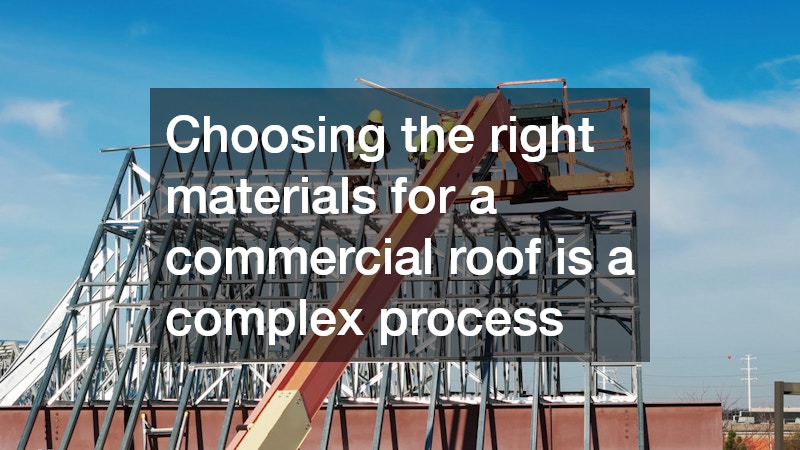Selecting the right materials for a commercial roof is one of the most important decisions a business owner can make. The durability, cost, and performance of the roofing materials directly impact the building’s protection, energy efficiency, and long-term maintenance expenses. Commercial roofs face unique challenges, including heavy foot traffic, exposure to harsh weather, and the need to cover large areas effectively.
Making the wrong choice can lead to frequent repairs, leaks, or even premature replacement. Conversely, selecting the right materials ensures the roof performs reliably for years to come.
Understanding what professional guidance commercial roofers provide can make this process easier and more effective for property owners.
Evaluating Durability and Lifespan
One of the first considerations commercial roofing professionals recommend is assessing the durability and expected lifespan of different roofing materials. Some materials, such as metal and single-ply membranes, are designed to withstand harsh weather, resist damage, and last for decades. Others, like traditional asphalt or modified bitumen, may offer lower upfront costs but require more frequent maintenance or replacement.
Roofers often advise evaluating both the material’s resistance to environmental conditions and its structural compatibility with the building. Choosing a material with a long lifespan may have higher initial costs but can significantly reduce maintenance and repair expenses over time. This balance between upfront investment and long-term performance is essential when planning a commercial roofing project.
Considering Energy Efficiency
Energy efficiency is another critical factor that roofers highlight when choosing materials. A reflective roof surface, for instance, can reduce heat absorption, lowering cooling costs for the building. Materials such as TPO, PVC, or coated metal panels are often recommended because they provide thermal resistance and help maintain consistent indoor temperatures.
Commercial roofers also suggest evaluating insulation requirements in conjunction with roofing materials. Properly integrated insulation can enhance energy efficiency, reduce utility costs, and improve occupant comfort. Selecting energy-efficient materials not only benefits the building’s operational costs but may also qualify the property for sustainability certifications or tax incentives.
Weighing Installation Requirements
Different roofing materials require specific installation techniques, which commercial roofers consider carefully. For instance, single-ply membranes often need professional welding or adhesive application, while metal panels require precise fastening and flashing. Choosing a material without accounting for proper installation can compromise the roof’s performance and durability.
Experienced roofers emphasize selecting materials that match the building’s design and the contractor’s expertise. A well-installed roof, regardless of the material, will outperform a poorly installed system made from premium components. This recommendation underscores the importance of hiring knowledgeable professionals to guide material selection and installation.
Assessing Maintenance Needs
Maintenance requirements vary significantly across roofing materials, and roofers recommend factoring this into the decision-making process. Some materials, like metal or TPO, require minimal maintenance, while others, such as built-up roofing, may need periodic inspections, sealant applications, or minor repairs to extend their service life.
Roofers advise choosing materials that align with the property owner’s ability and willingness to perform routine maintenance. Minimizing upkeep not only reduces operational headaches but also helps prevent costly repairs caused by neglect. Understanding maintenance demands before selecting materials ensures the building remains protected for years.
Prioritizing Weather Resistance
Commercial roofs must endure rain, wind, snow, and extreme temperatures. Commercial roofing professionals stress the importance of selecting materials that can withstand local climate conditions. For example, areas with heavy rainfall benefit from materials with excellent water resistance and proper slope for drainage. Regions prone to high winds require materials that remain secure and resistant to uplift.
Additionally, materials should resist UV damage, corrosion, and thermal expansion to prevent premature wear. By considering weather resilience, property owners can protect their investment and avoid frequent repairs caused by environmental exposure.
Budgeting for Cost and Value
Cost is always a factor in choosing materials, but roofers recommend evaluating both initial investment and long-term value. A cheaper material may save money upfront but lead to higher repair or replacement costs over time. Conversely, investing in a premium material can extend roof life and lower overall maintenance expenses.
Roofers often suggest balancing budget constraints with the need for durability, energy efficiency, and low maintenance. Strategic planning helps ensure the chosen materials provide the best combination of performance and financial sense for the business.
Making an Informed Decision
Choosing the right materials for a commercial roof is a complex process that involves evaluating durability, energy efficiency, installation needs, maintenance requirements, and cost. Following professional guidance can help property owners avoid costly mistakes and ensure the roof protects the building for years to come.
By following the recommendations of experienced roofers, property owners gain insight into which materials perform best under specific conditions, how to maximize energy efficiency, and which options require minimal maintenance. Selecting the right materials is an investment in the building’s long-term stability and functionality. In the end, careful planning and professional advice ensure the roof delivers optimal protection, value, and peace of mind for the business.




